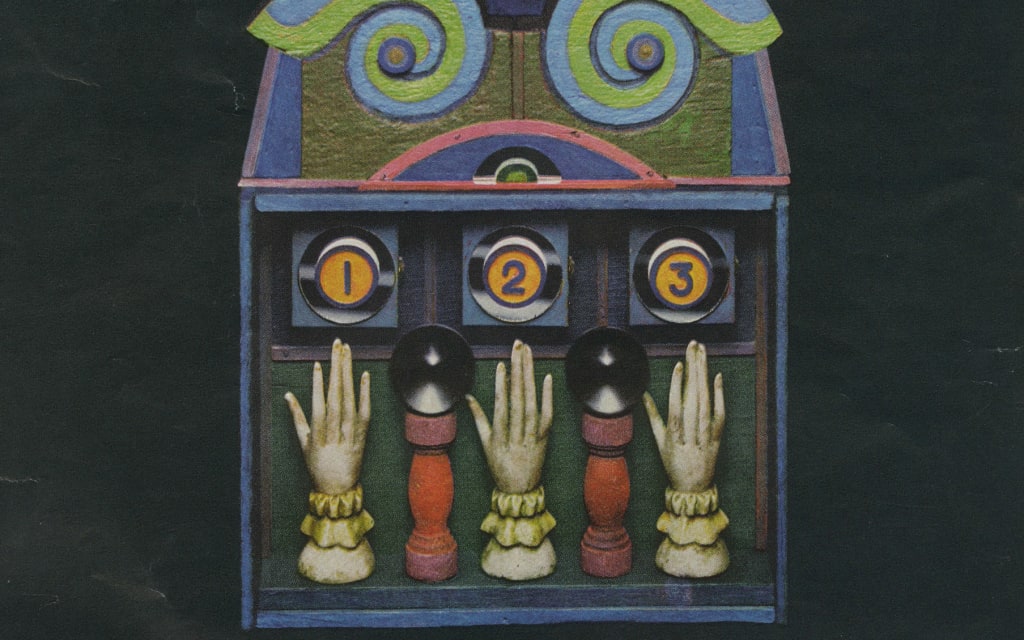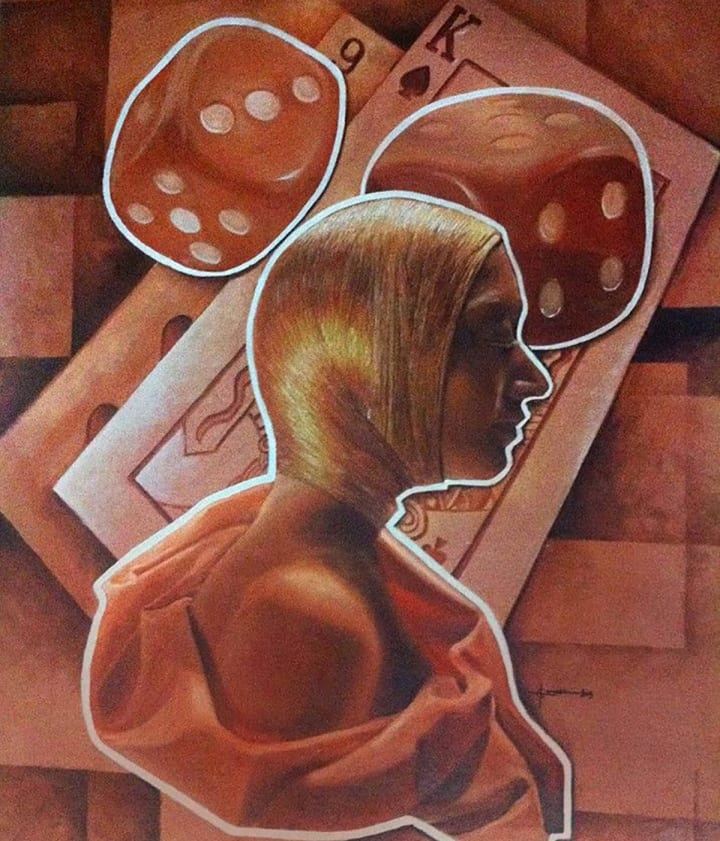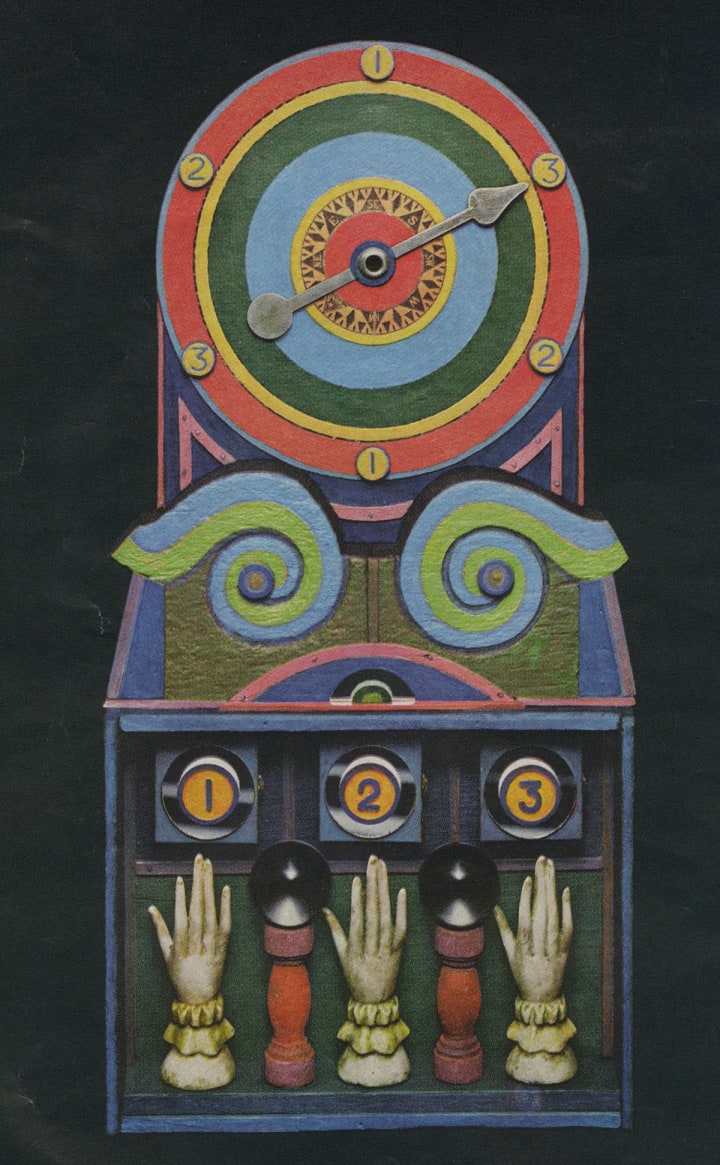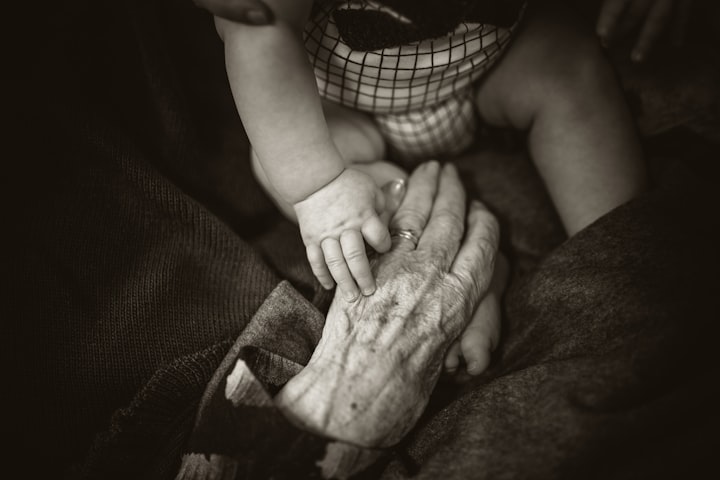Is Luck Real?
Attempts at controlling your fate may include a lucky rabbit’s foot and have you asking “Is Luck Real?"

Luck. It blunders in and out of our lives, unbidden, unexpected, sometimes welcome and sometimes not. It is the supreme insult to human reason: You can't ignore it, yet you can’t plan for it. No matter how carefully you design your career, you cannot know how the design will be changed by the workings of random events. You can only know that the events will occur. You can only wait for them, and hope that they're in your favor.
“Nobody has ever figured out a way to duck luck,” says Sherlock Feldman of Las Vegas. Feldman lives in a world in which people deliberately expose themselves to raw luck. He is casino manager of The Dunes, one of Nevada's biggest gambling clubs. On duty from 2:00 AM to 10:00 AM, he observes people who would rather play with luck than sleep. “The very fact that you exist at all is a matter of luck,” he explains. “If you want to scare yourself or be amused—depending on your viewpoint—find out how your father chanced to meet your mother. Maybe they met at a party. Maybe your father was only at the party because he happened to run into a buddy on a street corner and the buddy invited him to drop in that night. That's how close you came to not existing.”
Feldman, a beefy man with thick rimmed glasses and a look of sad good humor, does a lot of thinking about luck. “It’s a strange commodity,” he says. “You can get superstitious as hell about it. People come in here with rabbits’ feet and astrology charts and all kinds of crazy ideas about how they’re going to control their luck. I laugh. I say, 'There's no such thing as luck. It isn't a mystical something, it's just random events.' But then somebody comes in and pulls off the statistically impossible and I have to say, 'Well, yes, he must have had luck.' "

Image via Pinterest
Gambler's Luck
He recalled the innocent tourist who dropped in one night last year. “A guy, I don’t even know his name, a little guy from nowhere.” The little guy had about $1,000 with him and was prepared to lose it all. He thought he would like to try shooting craps. He had never played the game before and had to be taught how. Normally a crapshooter thinks himself lucky if he holds the dice—that is, continues winning—for five or 10 minutes, and a quarter hour is considered a superb run of luck. The little guy from nowhere hung onto the dice for a fantastic two hours and 40 minutes. When the incredible game ended, he had won about $30,000. “How do you explain a thing like that?” asks Feldman.
Many veteran gamblers around the little guy's table that night thought something was at work, though their definitions of this something differed. There were those who said he was “hot”—meaning, essentially, temporarily in a condition in which random events were being influenced to fall his way. Some of the onlookers talked about “psychokinesis”—a presumed mental capacity that enabled the amateur gambler to control the way that the dice would fall.
Others again spoke of his power of “precognition,” his ability to look into the future. Still others thought that his luck resulted from mysterious forces operating around him but not within him, not under his control—forces exerted by the stars that were favorably disposed toward the little guy from nowhere that particular night. A few thought that the winning streak had no special significance at all.
However you define luck, it's hard to deny that it exists. The phrase “streak of luck” is in the language because it articulates a common human experience. There are days when everything you touch turns to gold, and other days when things turn to dust and ashes. Some men seem consistently luckier than others—so much so that friends of the fortune-blessed individual will talk as though luck were a built-in part of his career equipment, like education. “That lucky bastard,” they'll say, “he can't do anything wrong!” His shoelace never breaks when he's hurrying to catch a plane. No waitress ever spills coffee on his pants when he's on the way to an important appointment. When his car conks out, he's always half a block from a service station. It never rains when he goes to a ball game; but when he wants to ski, it snows.

Image via Deviant Art
Different Strokes
Charles Alexander Wilson and Issur Danielovitch were both born in Amsterdam, New York. They were equally endowed with intelligence. Their fathers were immigrant laborers, and their families' economic and social standings were on a like basic level—rock bottom. Seemingly they were launched into life with about the same chances to succeed or fail. Charles Alexander Wilson became known to his friends as Banana Nose, a Bowery bum. Issur Danielovitch is known as Kirk Douglas. He is a Hollywood star and a millionaire.
Fortune has treated them unequally. Why? Are their characters different? Of course. To a large extent, a man makes his own fate. But is that all there is to it? How about luck—pure, blind, random, uncontrollable chance? Did luck play any part in the diverse lives of Kirk Douglas and Banana Nose Wilson?
It did—a very big part. There were events in both men's lives beyond their control, events that helped one man reach his pinnacle of success and knocked the other man flat.
Kirk Douglas and Banana Nose Wilson, of Amsterdam, New York, are two men who have long thoughts about luck. Oddly, Wilson seems more at home with his bad luck than Douglas does with his good.
Wilson says: “I stopped fighting it long ago. The hell with it. Life can take me where it wants. I’ll go quietly.”
Douglas says: “A man likes to feel he's in control of his life, but it’s a damned illusion. The “X” factor is always there—luck, whatever you want to call it. You can have all the talent in the world, but without luck you go nowhere. It’s frustrating because you can’t do anything about it.” Issur Danielovitch was a tough kid from a tough neighborhood, with no apparent prospects for any great success. “I was going no place. I wasn’t interested in anything except girls. I was the kind of kid who, as an adult, would end up as a clerk in an Amsterdam department store. But then this crazy "X" factor blew into my life for the first time. In high school, by chance, I was assigned to a class run by a teacher named Louise Livingston, and one day she asked me to take a small part in a school play. There was no reason for her to do it—it just happened, it was an unlikely chance. If it hadn't happened, nobody outside Amsterdam would know my name today. But it did happen.
Young Danielovitch, before becoming Kirk Douglas, worked his way through college (partly as a clerk in an Amsterdam department store), went to New York City, and tried to break into show business. “For a long while it looked as though luck had gone. I lived in a grubby little room in Greenwich Village, worked in a small diner. I got a couple of bit parts on Broadway. In one play, I was an off-stage echo. When I went into the Navy, I seemed to be no further along in my acting career than when I’d started.”
But luck was operating in its own secret way. One of the girls whom young Kirk Douglas kissed goodbye was a struggling young actress named Lauren Bacall. While Douglas was out in the Pacific, Lauren Bacall enjoyed her own run of luck and became a Hollywood star. She induced a Hollywood producer to watch Douglas act when he got back to civilian life, and his movie career began. “Oh, sure,” he says, "I guess I had some kind of talent. But if I hadn't had this Lauren Bacall situation, where would the talent have gone? Dozens of my friends back then had talent, too, but they didn't have the luck.”
After acting in obscure second-rate movies for a while, Douglas one day had a hunch that he had to follow. He was offered parts in two movies. One was a big, expensive production by a wealthy company that could offer him a lot of money. The other was a low-budget production by a small company able to pay only a minimum. "Why did I choose the little company? I didn't know then and I still don't today. It was a wild hunch.” The little company's movie was entitled Champion, and it made Douglas a star.
One day following that success, producer Mike Todd invited Douglas to fly with him to New York. “At the last moment,” Douglas explains, “I didn't go. There were circumstances... luck, I guess you'd call it. I had my bags packed, but I didn't get on the plane.” The plane crashed, killing everyone aboard.
Luck. Issur Danielovitch plainly had it. Charles Alexander Wilson didn't. While Danielovitch was going up, Wilson was going down.

Wilson's Withering Luck
Wilson was born in the same tough section of Amsterdam. He did well in his early years of school; He recalls that his grades were mainly As and Bs. When he was about twelve, his father heard of a semi-skilled job in Providence, Rhode Island, and the family moved. "It seemed like good luck for my old man because his wages went up a bit, but it was bad luck for me. I'd been happy in school before, but I never made it in the Providence schools. I ran into some bad teachers. There was one who kidded me about my big nose, and the kids took it up from her, and I never got to be anything but an outsider. I was Charlie the Beak, the kid everybody laughed at. Well, hell, that kind of thing bothers a kid. My grades fell. I guess from then on I was marked as a loser. I had the loser psychology. I'd only just started, but I was already finished.”
Unlike young Danielovitch, whose chance contact with a good teacher showed him the value of education, unlucky Charlie Wilson came to hate it. He dropped out before finishing high school. He worked as a laborer. “Every now and then I'd try for a better job, but I had 'loser' written all over me. I'd apply for a job believing I wasn't going to get it. I'd apologize to the guy for wasting his time. Naturally he wouldn't give me the job.”
But a break did eventually come Wilson's way. He got a job driving for a small trucking company. He and the owner of the business grew to become friends. The owner, an older man, wanted to retire and began to talk about turning the business over to Wilson as manager and partner. Wilson saw a chance to succeed at last, grew excited over the deal and studied the economics of the trucking business. "I was going to be a businessman! I thought I'd finally made it!”
But before Wilson and the owner of the company could get to the proper paperwork, the old gentleman passed away.
Wilson drifted from job to job. Then one day, jobless again and hungry and without hope, he passed an Army recruiting poster that promised to teach him a trade if he would re-enlist (he had previously been in the Army). “It seemed like an answer. Here was a new chance to learn something useful.”
He enlisted in the early summer and was deployed to war not too long after that. Upon his return he drifted to New York City, blew all his back pay and his frontline bonus, and started looking for a job. “I was forty. I thought I had to make it this time or I'd be through forever. I quit drinking, dried out completely, got myself a decent looking set of clothes. I mean, I was really determined to give it one last try.”
But he had no skills to offer any employer. One day, sitting gloomily on a park bench scanning job ads on his phone, he had what he now considers the unluckiest break of his life. “I’m sitting there and a guy comes from nowhere and sits next to me. A bum, ragged, flushed up. He says, 'Out of a job?' I say yes, and he says, 'Go to the soup kitchens and shelters. Destitute men can get free meals and bed tickets redeemable at restaurants and hotels in the Bowery.' I just gave up. I didn't have to hunt a job any more. From that day on I was trapped."
He went on to spend his time in several bars, getting the cheapest alcohol he could. Banana Nose (he likes the name), still clings to his measure of self-respect. He shaves daily. His hair is neatly combed; his fingernails are clipped short and perfectly clean; his clothes are old but neat. He also clings to a certain sad optimism. “Most of what has happened to me is probably my own goddamn fault,” he told a reporter, “but some of it has been plain bad luck, and I keep thinking maybe my luck will turn some day. Luck can turn, can't it?”
But what is luck? “You can read case histories like these in any of several ways," says Dr. Jean Rosenbaum, a New Mexico psychoanalyst who is fascinated by what he calls “the syndrome of the chronic loser.” A man’s own character may help shape his luck, says Doctor Rosenbaum, but luck may have shaped his character to begin with. "It's very hard to separate the two factors.” If you examine a chronic loser's life story, he says, you usually find that he's invited much of his own bad luck. So luck is the result of one's character, but what had formed his character?

Image via List Ogre
Studying Luck
Many people think they do know why. Numerologists, for instance, believe Lewin won twice because his tickets had lucky numbers. His two winning tickets were numbered consecutively 10,522,453 and 10,522,454. If all these individual digits are added up they total 45—which is considered by some adherents of the mystical pseudoscience of numerology to be an overwhelmingly lucky number. (It is the “king number,” the total of all the digits from 0 to 9.)
Students of luck have attempted more scientific examinations of it. One of the most famed investigators of luck is psychologist Joseph Banks Rhine, who pondered, “Is there an element of direct mental action operating at times to influence results in games of skill and chance?” Rhine believed the answer is “Yes," but he did not convince a majority of fellow scientists.
In Rhine's view, luck may result partly from precognition, psychokinesis, and other manifestations usually catalogued under the general heading of extrasensory perception, or ESP. Rhine performed literally thousands of experiments to find out whether ESP exists and, if so, what it is and how it operates. Generally these experiments involved attempts to influence the roll of dice or to guess what cards somebody else is holding. If such an ability actually exists, it would help explain why Kirk Douglas failed to board Mike Todd's plane (precognition) and why the amateur crap shooter held the dice for two hours and 40 minutes (psychokinesis).
А somewhat more pragmatic approach to the causes of luck is that of economist A. H. Z. Carr, who was an adviser to Presidents Roosevelt and Truman. “You can't win a game without entering it,” said Carr. To attract lucky chances, you must put yourself in a position to receive them—"expose yourself as fully as possible to the fluid circumstances of life." To boil this precept down to its essentials, it means get into contact with as many people as possible.
Kirk Douglas hit Hollywood because he was in contact with Lauren Bacall. She was one of several hundred people whom the amiable young actor had taken the trouble to befriend. By being in contact with many people, he made the odds favorable. Banana Nose Wilson never made many friendly contacts. Knowing few people, he had relatively few chances of hearing about a good job or lucking into some opportunity through a friend-of-a-friend. “Yes, that book is right,” Wilson told his reporter friend as they strolled down a crowded New York sidewalk. “Luck comes mostly from other people. If I could live my life over, I'd get to know a lot more people.”
“Why not start today?" asked the reporter. “You talk as though you're already dead, for God's sake.”
“You’re right!" Wilson's voice rose with enthusiasm. “I’ll try it. People, that's what it's all about. There's no such thing as bad luck.”
From a ledge high above the sidewalk, a pigeon emptied its bowels. The dropping could have fallen on any of several hundred strollers. It landed on Banana Nose Wilson's sleeve.
“Oh, the hell with it,” said Wilson.
About the Creator
Futurism Staff
A team of space cadets making the most out of their time trapped on Earth. Help.






Comments
There are no comments for this story
Be the first to respond and start the conversation.